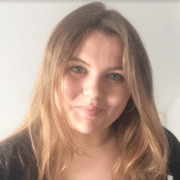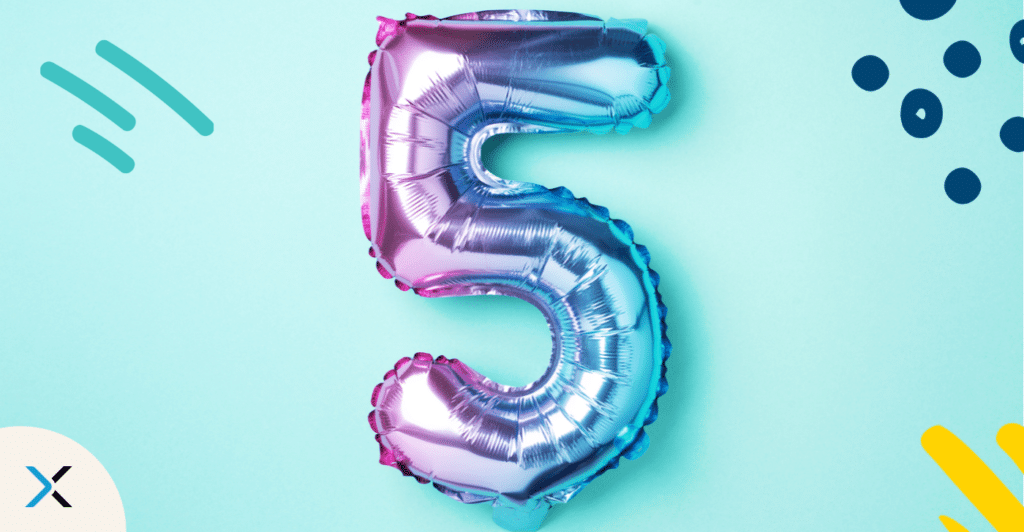Ableism in Language: Why Enterprises Need to Prioritize Inclusivity

Does your content really speak to everyone?
With one billion people with disabilities, they make up the largest minority in the world. But when it comes to enterprise events, often they’re reduced to a single check box that doesn’t take into account the diversity of disabled people. And it doesn’t reflect the inclusive culture that all enterprises should be striving for.
Disability activist and co-founder of Access2Funding CIC, Celia Hensman, explores how ableist language is rife in our everyday words and phrases and how we can overcome ableism through education. Celia also shares tips on how enterprises can become more inclusive, both in terms of their language and their actions.
It’s time to get some insight from the flock on how to create a more inclusive workplace.
Watch the episode
Listen to the episode
Read the full episode transcript
Hello Celia, welcome to the show!
Hi. Thank you so much for having me.
This is a really interesting conversation that we’re going to have today, but before we get started, I just want to move through the quick-fire questions, just to set the tone.
Amazing content is …
Imaginative and collaborative.
Concise or descriptive?
Depends on the situation, I think.
The company with the best brand voice is …
Tricky. I can’t say my own, can I? I would say The Female Lead.
Best piece of content advice for someone?
Draw on other people’s knowledge to connect with other people.
And when I’m creating content, I always …
Think of something imaginative that hasn’t been said before.
Fantastic. All right, Celia, welcome aboard. Let’s talk a little bit about you. I have your bio in front of me, but I can’t do it justice. Can you tell our listeners a little bit about yourself?
So my name is Celia, I’m from the UK. I was born with a connective tissue disorder, which makes me a disabled woman, which has got worse as I got older. It’s very complicated. Nobody’s ever heard of it. It’s called Loeys-Dietz Syndrome, very weird and wonderful.
I’ve been engaged politically from a very young age, participating in select committees. I did a bit of work with Amnesty International when I was a teenager, and it all snowballed into now me being the co-founder and director of The Disability Policy Centre, which is the first think tank in the UK, and as far as we know in the world that focuses on disability and accessibility.
So putting the conversation around disability and ableism at the heart of government. So we work with Westminster, ministers, Cabinet, policy leaders, companies, and charities to make sure that legislation is improved, amended, and new legislation is brought in. So it’s a pretty extensive job, it must be said. And then aside to that I do a lot of campaigning work around disability and ableism and raising awareness.

So I’d like to talk about the ableism aspect because I think something that we tend to talk about and enterprises think a lot about is diversity and inclusion and how we build that into our content. And what you don’t hear as much is ableism in language and in business content.
Do you have any examples of how ableism is in everyday language?
We’re losing about 14 percent of our GDP because we aren’t using disabled entrepreneurs Share on XIt’s absolutely rife. And I think the first thing I would say before we start is, when you’re talking about disability, one in five people in the UK are disabled. And when you take the global population of disability, it’s larger than the population of China. It’s over 15 percent of the world. Disability is the largest minority group in the entire world. So disability has to be part of the diversity conversation.
When you look at everyday language and the words that people are using, it’s absolutely everywhere. There are very obvious things, like when people say, “Well, you don’t look disabled, I never would have guessed.” Or “You don’t seem dyslexic, you can read so well, you seem so clever, and you’ve got such a good job.”
And then there are other words where you can see it’s entrenched within our language that maybe people aren’t quite so conscious of. So we use the words “crazy” and “mental” a lot in our language. You go, “Oh my gosh, that’s mental, that’s crazy.”
It’s absolutely everywhere, it’s rife and the history of where it comes from is a negative place. It wasn’t a word to describe something. It was a word used to label people and put people in a box, to imply that there was something “wrong” with them. And I use that in inverted commas because obviously there’s nothing wrong with being disabled.
Disabled people are the most diverse group there is in the world. But actually, the commonalities between us are so few and far between. What does unite us is the experiences that we’ve had and the ableism that we’ve faced in the world. Things like, if you hop out of your car and you’ve got a blue badge and you’re not in a wheelchair, someone is going to, 99 percent of the time, look at you funny or say something. Ableism is absolutely everywhere.
I think as we create the words that we use for business, we’re good at identifying obvious examples, like “master/slave” in code or other examples when building technical documentation.
How do you work with companies to find the things that aren’t as obvious, that are identifying, I don’t want to say triggers, but issues for people that you might not think of?
I think that the biggest takeaway is that disabled people are noticeably absent from the conversation. And a lot of that’s rooted in systemic differences — where disabled people aren’t at the top of business, they’re not in the FTSE 100, and they’re not in managerial positions. Because the medical model of disability isn’t alive and well, but it’s about communication and consultation.
You’ve got to speak to the people that have that lived experience and you’ve got to connect that data from those individuals. As a society, we’re at a point where we now understand what’s okay and not okay when we’re talking about race, when we’re talking about gender, when we’re talking about sexuality, and all of the other social movements. We’re at a place where as human beings we have an innate understanding of what is right and wrong.
Only 16.7 percent of disabled people feel like they have the same access to opportunities and outcomes as non-disabled people. Share on XThe disability side of social movement isn’t at that point yet. There isn’t that intrinsic knowledge. I look at the words I used when I was at school, and I’m obviously not going to say them now. There were words that were part of our repertoire that weren’t offensive, they were slang, but we threw them about. Because no one was educating us about disability.
So what we have to do at this point of the social movement, when people don’t have that intrinsic knowledge yet, is speak to the people that do have that lived experience. And therefore the intrinsic knowledge of what they think is acceptable and what they think isn’t acceptable, because they’re the best people to tell you.
So from a business perspective, ERGs (Employee Resource Groups) are the best way to go. Then companies turn around and say “Well we don’t actually have any disabled people on our team” and my response is you probably do because it’s one in five people but they’ve just not declared anything. And if you actually don’t then I think you need to look at yourself as an organization — if you haven’t got even a single person that can lead a conversation.
And I think because it’s a newer area, it’s not like compliance where there’s a right and a wrong. It’s easy to, I think, go in directions that may or may not work.
So talking to the people that work in your organization is really important because, for example, “disabled person” versus “person with disabilities,” who makes that decision? It isn’t a mathematical equation. It’s a decision that individuals make. How do you bridge that gap?
The thing about disability conversation, and this is me waving a white flag saying, people are going to make mistakes around the language. And that goes back to what I was saying before about the fact that the disabled community is so diverse. I have a physical health condition and I’m also neurodiverse, but I have no idea what it’s like to live with a visual impairment or a hearing impairment. But under legalities I’m in the same category as that person and we have very different experiences to one another, yet we’re banded together.
And my answer to that’s go with what the majority look for, but respect that in individual situations there may be individuals that say, “Actually, when referring to me, could you use this language instead?” And I think it’s very important as a society, we show that we’re open to individualism. It’s not always a blanket approach to everything, it’s about getting to know people as well.
There are the Medical and the Social Models of disability, which really tie into ableism. Currently we’re living in this weird in-between state where we’re trying to shift from one to the other. So the Medical Model says that disabled people can’t do things because of their disability. It’s because of who they are, it’s what their makeup is, it’s got nothing to do with society, it’s just “you can’t do it because you’re disabled.”
The Social Model says, actually, people are being disabled by society. So the barriers you put in place, the way you speak to me, and the preconceived notions that you have of me are what makes living with a disability difficult. It’s not the disability itself. Of course, medically, there are challenges that I wish I didn’t have, but that’s not what’s inhibiting me in society. It’s what you’ve done. It’s the barriers that you’ve put in place. And ableism in language ties into that completely.
You've got to speak to the people that have that lived experience and you've got to connect that data from those individuals. Share on XSo looking at the creation of a customer experience, for instance a digital customer experience, you can actually block people from having that customer experience or at least experiencing a positive customer experience just by the way that you communicate — without even thinking about it. You’re just making it more challenging for people to see themselves in that experience.
100 percent. A really easy example to give is, quite often when you’re applying for a job, you’re filling out a form, or you’re attending an event “Do you have a disability that we need to be aware of” is a single check option. That’s ableism right there. I have multiple disabilities but 99 percent of the time you best believe that those forms are just going to let me click one of those options. I have to pick which one I’m going with today as my one that’s likely to affect me most at whatever I’m doing or signing up for.
And then the spectrum of your options is so huge. What does it mean? Yes, I have a disability. What do you do? How do I use that information on the other end? If it could be a hearing issue versus far the other side of the spectrum, I’ve only asked you one question.
Exactly and that one question, getting it wrong, has already told me that as an organization you’re not educated, you’re not conscious, and you’re not actually that accessible. It makes me wonder, well why are you asking me that question? Are you actually going to provide the reasonable adjustments or are you just collecting data on me? And the fact that you haven’t got that one question right tells me that it’s the former, you’re just collecting data on me and you don’t actually care.
Well, I’d love to think that just small new companies are having that challenge. But up until recently, big, huge companies that I don’t want to name for all kinds of reasons, didn’t have in their diversity statement, a statement on disability. So it’s not just the small companies, it’s the very large companies.
There are people listening right now that are thinking, “Oh, I do have a single checkbox.” How would you even start to move from a single checkbox to being able to be inclusive in this space?
One of the biggest, I think, challenges that disabled people face are misconceptions. It’s how people from the outset view us.
So, for example, if we talk about dyslexia and other learning differences, instantly, intrinsically as human beings, we go to “struggle with reading, struggle with writing, probably can’t think that quickly, not very clever, work very slowly” yada yada. When actually that’s not always the case at all. Dyslexic people are perfectly capable of living a full and enriched life, but it’s that intrinsic understanding of what that means.
Or if you declare that you have a long-term health condition and that you might have periods off sick or whatever it may be, people’s minds instantly go to, “they’re not a reliable person, they’re not a person that I can count on, they’re probably gonna take lots of time off.” So what has to be done from the outset is raising awareness, not always talking about the difficulties of being disabled and the barriers there are, but also highlighting how capable we are as people.
If you look at language around disability, something that I can’t stand is that when people are referring to the opposite of disabled people, they don’t say “non-disabled people,” they say “able-bodied people.” Just that word “able” infers that I’m not an able individual, I’m disabled and you’re abled.
The commonalities between us are so few and far between. What does unite us is the experiences that we've had and the ableism that we’ve faced in the world. Share on XSomething so simplistic as that language creates this stance in society that automatically you think we aren’t competing in the same environment and we’re less intelligent, less able, less capable purely because of how we were born or what we acquired later in life.
So I see the challenge, right? Because on the one hand, I feel uncomfortable asking the question, are you disabled, what’s your disability? Because if I do that, I’m going to give myself the ability to have these preconceived notions versus saying, “okay, well, I’m looking at you and you look fine,” which also isn’t the right answer because that doesn’t support your work style, the way that you’re going to communicate, and the experience that you’re looking for.
I assume this is the work that you do when you work with companies and governments to help people walk this line. Can you talk a little bit about how you help government organizations or the United Nations walk this line to be inclusive without being offensive, without creating preconceived notions, and allowing people to have the experiences they want to have.
Exactly. I’m a bit of a history policy data freak. And to me, the answer first and foremost lies in the data. So one of the recent projects we did access to funding, which we’re still working on, is looking at disabled entrepreneurialism. Statistically disabled people are much more likely to set up their own companies because of the barriers in employment. So theoretically it would be easier to be able to work for ourselves and work around our own lives and our own things that we have to take care of.
One statistic that we found is that only 16.7 percent of disabled people feel like they have the same access to opportunities and outcomes as non-disabled people. 16 percent.
So what we do is we collate this data together, we collate these experiences with round tables, with policy leaders, with influential individuals, with the general populace, and we culminate it and formulate it all together into lovely shiny policy paper documents that are very long. So if anybody ever wants to go and read them, read the executive summaries so you’re not drowned out.
Then we take that forward to Number 10, or we take that forward to ministers or policy leaders. It doesn’t have to be someone governmental. There are policy leaders throughout our society that are independent of the government as well. And what we say is, this is the data. This is what’s happening. And this data has never been collected before. That’s why we set up as an organization. We were saying, “Why is this data not being collected?”
One of the really good examples I use, when you search “founder” on a search engine and you see “female founder” or “black female founder.” So many results come up and it’s amazing to be able to see the work that’s going on. When you Google disabled founder, I think there’s something like 400 million less results. They’re out there, they’re just not getting the profile and the opportunities that they need.
So what we do is we take all this data and we take it to the policy experts and say, as a country, we’re losing about 14 percent of our GDP because we aren’t using disabled entrepreneurs and someone can’t argue with that. Someone can’t turn around and say “that’s pretty small.” And actually what we’re doing is painting a picture of how much we’re hemorrhaging as a society economically, also from an equality and morality perspective.
As the 14th most developed country in the world, you’d think that we need to prioritize. We’re seeing that shift starting to happen, but that shift needs to happen quicker. And that’s why we’re here as an organization, we’re trying to speed that momentum up because currently it’s just moving too slowly.
Disability is the largest minority group in the entire world. So disability has to be part of the diversity conversation. Share on XWow. Okay. What you’re doing is very individual and very important. And you can’t argue with the numbers. That’s the thing, there’s a specific gain to be had if this is handled correctly. If it’s ignored, there’s phenomenal loss. Very, very interesting.
So I think I want to jump to the PSOTD (Provocative Statement of the Day) because I think that whatever you’re going to say next will be interesting. Provocative Statement of the Day: A position you hold, may or may not be super popular, that’s just going to get people thinking.
I say this quite frequently, but it’s about showing up for yourself. I’ve previously not had that attitude and I’ve always put my work first, put other people around me first, and I forget about myself. And what I’ve realized is that I can’t be the most productive that I want to be unless I show up for myself first, and I prioritize myself and my own wellbeing.
And yes, that’s because I’ve got other things to be worrying about. I can’t eat or drink anything. It’s very bizarre, I’m fed completely artificially, so I have to show up for myself. But in that, I’ve changed my attitude around what’s achieving and what’s accomplishing something, because we’re constantly striving for that next thing. You sit back and you’ve had a quiet day and you think, “Oh, I didn’t do anything today.”
And actually, my priority today was showing up for myself and I tidied my house and I did the day-to-day task that I needed to do. In myself, I took that mental rest and that mental break, which meant I was able to come back stronger. I think more people need to adopt that attitude of showing up for themselves and being their best ally.
That’s a great position to take. A lot of people don’t think that way. It’s about dealing with everything that’s around you. And I see this here at work, I see that out in the world. There’s so much to do. And I’ve got to solve everybody else’s problems first and I’m left behind. You can’t be the best version of yourself if you’re doing everything for everybody else.
Draw on other people's knowledge to connect with other people. Share on XI think especially in a case where the things that you’re biting off are so huge and so important and the companies and organizations you’re working with are so big that the value that you provide is predicated on your ability to show up for you first. If you don’t do that, I think all of this is going to be muted.
Thank you for showing up. Thank you for being on the show. This has been a fantastic episode and I would be excited to bring you back in the future to talk more about this.
Thank you so much for having me. Thank you.
Thank you.
About Celia Hensman
Celia Hensman is the Co-Founder and Director of The Disability Policy Centre, the first think tank of its kind in the UK, disabled led, and dedicated to the development and advancement of policy, ensuring that accessibility is at the heart of legislation. Celia works closely with Government, Westminster, and policy leaders locally and nationally in the UK, and around the world, to ensure the amendment of current legislation and the implementation of new legislation centered around equality, diversity and inclusion. Celia is an advocate for disabled representation, inclusion, and accessibility, and has worked with prominent organizations such as LinkedIn, The House of Lords, The United Nations, and Councils across the United Kingdom.
Important links
- Celia Hensman – LinkedIn
- The Disability Policy Centre
- Access2Funding CIC
- WordBirds – LinkedIn
- WordBirds – Home page
Are you ready to create more content faster?
Schedule a demo to see how content governance and AI guardrails will drastically improve content quality, compliance, and efficiency.

Charlotte Baxter-Read
is a Communications and Content Manager at Acrolinx, bringing over three years of experience in content creation, strategic communications, and public relations. Additionally, Charlotte is the Executive Producer of the WordBirds podcast — sponsored by Acrolinx. She holds a Master’s degree from the John F. Kennedy Institute, at Freie Universität Berlin, and a Bachelor's degree from Royal Holloway, University of London. Charlotte, along with the Acrolinx Marketing Team, won a Silver Stevie Award at the 18th Annual International Business Awards® for Marketing Department of the Year. She's a passionate reader, communicator, and avid traveler in her free time.




